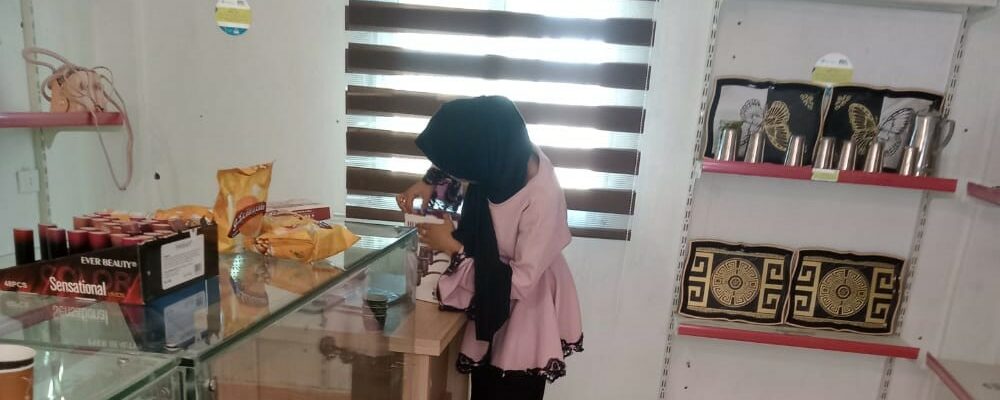
“The project was a landmark in the form of the services offered to the residents of the village in general and to the residents of the area in it in particular” Mai said.
Mai Bani Atieh proceeded to establish a shop for housewares which she made into a multi-purpose shop in Al-Qataraneh area. The story began with the perception that the services are poor, which spurred action to establishing a project that serves the residents.
Mai Bani Atiyeh says, “Al-Qataraneh lacks a shop which would serve the residents travelling to the city of Karak to buy housewares.”
She adds: “I considered, and my partner Saeda, opening a shop, and accordingly we communicated with “AZEM” project which is supported by UNICEF and implemented by BDC, which provided us with all the facilities, dispatched a specialized team to carry out maintenance, and provided furniture.”
She says that with the passage of time she and her business partner became adept in business, which was reflected in the income of the shop. Thus the two owners opened sections, because social traditions encourage ladies to deal with shops managed by women.
Mai Bani Atiyyeh adds that the new sections which I financed through the income of the shop raised the ceiling of expectations, given that they sufficed with a high school certificate.
Mai Bani Atieh proceeded to establish a shop for housewares which she made into a multi-purpose shop after adding to it new commercial sections in Al-Qataraneh area south of the capital Amman. The story began with the perception that the services are poor and that there is a paucity of job opportunities, which spurred action to establishing a project that serves the residents and creates job opportunities. Thus, two young women rose to the challenge and established the shop.
The project owner Mai Bani Atiyeh says, “Al-Qataraneh lacks a shop which would spare the residents travelling to the city of Karak to buy housewares which are especially popular with women, where these housewares assist the housewives and employees to accomplish the daily household chores and are used to prepare food or cleaning or to adorn the corners of the house in addition to the cosmetics and perfumes of women.”
She adds: “I considered, I and my partner Saeda, opening a shop that supplies all those needs which are considered basic in Jordan and the various areas, and accordingly we communicated with “AZEM” project which provided us with all the facilities, pointing out that “AZEM” dispatched a specialized team to carry out necessary maintenance of a warehouse which I had rented. Moreover, “AZEM” provided merchandise, shelves, equipment, and furniture for the shop thereby making it suitable for welcoming customers.”
She says that with the passage of time she and her business partner became adept in business, which was reflected in the daily and monthly income of the shop and enabled them to add new sections which respond to the needs of the residents who suffer from rising unemployment. Thus the two owners of the shop opened sections for shoes, bags, detergents and some requisites for university students, and a section for preparing brides, and it was well received because social customs and traditions encourage ladies to deal with shops in which work women from among the residents of the area, which fed into the interest of the project of Mai.
Mai Bani Atiyyeh adds that the new sections which I financed through a part of my savings and the income of the shop raised the ceiling of expectations for the success and continuity of the shop, while the project constituted a milestone in the form of the services offered to the residents of the village in general and the residents of the immediate neighborhood in particular, and she aspires to expand the project and add commercial sections and new kinds of merchandise serving the residents, given that they sufficed with a high school certificate and were not able to obtain university education
She adds that there is high demand for the shop by women particularly since the surrounding population centers are devoid of this service.